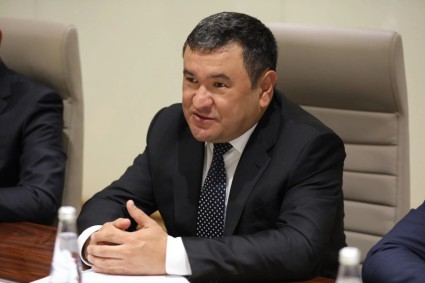Uzbekistan aims to achieve an investment grade rating and complete the privatization of 29 large state-owned enterprises by 2030, said the Deputy PM/Minister of Economy and Finance Jamshid Kuchkarov, speaking today at the Investor Day organized by Franklin Templeton – managing company of the Uzbekistan’s National Investment Fund.
According to him, President Shavkat Mirziyoyev has given directives to achieve an investment-grade credit rating of BBB+ by 2030. "This reflects our commitment to ongoing reforms and sustainable economic growth," he emphasized.
Kuchkarov stated that in June 2025 S&P had upgraded Uzbekistan's sovereign rating from BB- to BB+ with a positive outlook.
"This is a historic recognition of the country's growing financial reliability in international markets," he said.
He added that 16 large state-owned enterprises had already received international credit ratings from S&P, most of them at the BB level.
"A number of other enterprises are currently undergoing the rating assessment process. Furthermore, several companies have already received ESG ratings," he noted.
The Deputy PM emphasized that "progress in corporate governance, transparent financial reporting, credit and ESG ratings had laid the foundation for the next phase of economic transformation—privatization and capital market development."
He noted that national legislation was being aligned to ensure full compliance of Uzbekistan's legal framework with international capital market standards.
He stressed that Uzbekistan continued to implement its program of transformation and privatization of state-owned enterprises.
State-owned enterprises and banks privatization strategy for 2026-2030 is being developed jointly with the Asian Development Bank and the World Bank. The strategy is expected to be readied by the end of this year.
In pursuance with the presidential decree, Uzbekistan is eyeing to privatize 29 large state-owned enterprises (UzAuto Motors, UMS, Uzmetkombinat, Navoiazot, power plants, and others) before 2029. The program covers key sectors—telecommunications, energy, and mining.
According to him, over the next three years, 12 large enterprises will conduct IPOs and SPOs on domestic and international stock exchanges. The National Investment Fund is preparing a dual listing in Tashkent and London, with the option of placing up to 75% of shares to attract institutional investors and create a more liquid and diversified market.
"The National Investment Fund will play a key role in expanding foreign investor participation in Uzbekistan's economy," Kuchkarov added.
He also announced that a list of more than 150 share packages were to be sold at open auctions. The assets span a wide range of sectors, including energy, construction, manufacturing, transportation, telecommunications, insurance, and services.
"We are also promoting corporate governance reform to ensure companies comply with international standards," the Deputy PM emphasized.
The ratio of independent directors on supervisory boards has reached 25%. "The next goal is to increase this figure to 50%," Kuchkarov said.
He noted that all large state-owned enterprises had begun publishing financial statements in line with international standards (IFRS) and are audited by leading international firms.
The next step will be the introduction of semi-annual IFRS reporting, which will allow for more frequent disclosure of information on activities and provide investors with up-to-date financial data.
"A recent presidential decree established that IFRS accounting would be mandatory for all state-owned companies, and national accounting standards will be harmonized with international ones. This reform will complete the transition to IFRS and ensure full compliance of Uzbekistan's financial system with global standards," Kuchkarov concluded.












